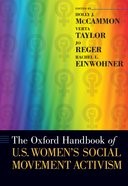 The Oxford Handbook of U.S. Women's Social Movement Activism
The Oxford Handbook of U.S. Women's Social Movement Activism
Contents
-
-
-
-
-
-
-
-
-
-
-
-
-
-
The Heroic Period: 1954–1966 The Heroic Period: 1954–1966
-
Early Depictions: The Mythical “Backbone” Early Depictions: The Mythical “Backbone”
-
Bridge Leadership and Sexual Violence Bridge Leadership and Sexual Violence
-
Race versus Gender Respectability Race versus Gender Respectability
-
-
All Power to the People: 1966–1974 All Power to the People: 1966–1974
-
“Racism and Sexism in America Were Equal Partners in my Oppression” “Racism and Sexism in America Were Equal Partners in my Oppression”
-
-
But Some of Us Are Brave: 1974–1980 But Some of Us Are Brave: 1974–1980
-
Dispelling Myths Dispelling Myths
-
-
Contemporary Black Liberation Movements and Future Directions Contemporary Black Liberation Movements and Future Directions
-
Notes Notes
-
References References
-
-
-
-
-
-
-
-
-
-
30 Women’s Activism in the Modern Movement for Black Liberation
Get accessAisha A. Upton is a doctoral candidate at the University of Minnesota. She researches race and gender, social movements, organizations, civil society, and civic participation.
Joyce M. Bell is an Associate Professor and Don A. Martindale Endowed Chair of Sociology at the University of Minnesota and author of The Black Power Movement and American Social Work. Her research focuses on race, work and organizations, and social movements.
-
Published:10 May 2017
Cite
Abstract
This chapter examines women’s activism in the modern movement for Black liberation. It examines women’s roles across three phases of mobilization. Starting with an exploration of women’s participation in the direct action phase of the U.S. civil rights movement (1954–1966), the chapter discusses the key roles that women played in the fight for legal equality for African Americans. Next it examines women’s central role in the Black Power movement of 1966–1974. The authors argue that Black women found new roles in new struggles during this period. The chapter ends with a look at the rise of radical Black feminism between 1974 and 1980, examining the codification of intersectional politics and discussing the continuation of issues of race, privilege, and diversity in contemporary feminism.
Sign in
Personal account
- Sign in with email/username & password
- Get email alerts
- Save searches
- Purchase content
- Activate your purchase/trial code
- Add your ORCID iD
Purchase
Our books are available by subscription or purchase to libraries and institutions.
Purchasing information| Month: | Total Views: |
|---|---|
| October 2022 | 36 |
| November 2022 | 12 |
| December 2022 | 6 |
| January 2023 | 4 |
| February 2023 | 11 |
| March 2023 | 4 |
| April 2023 | 10 |
| May 2023 | 6 |
| August 2023 | 1 |
| September 2023 | 25 |
| October 2023 | 1 |
| December 2023 | 1 |
| January 2024 | 2 |
| February 2024 | 4 |
| March 2024 | 5 |
| April 2024 | 6 |
| May 2024 | 8 |
| June 2024 | 5 |
| July 2024 | 4 |
| September 2024 | 10 |
| October 2024 | 1 |
| November 2024 | 8 |
| December 2024 | 4 |
| January 2025 | 1 |
| February 2025 | 10 |
| March 2025 | 8 |
| April 2025 | 5 |
| May 2025 | 1 |
Get help with access
Institutional access
Access to content on Oxford Academic is often provided through institutional subscriptions and purchases. If you are a member of an institution with an active account, you may be able to access content in one of the following ways:
IP based access
Typically, access is provided across an institutional network to a range of IP addresses. This authentication occurs automatically, and it is not possible to sign out of an IP authenticated account.
Sign in through your institution
Choose this option to get remote access when outside your institution. Shibboleth/Open Athens technology is used to provide single sign-on between your institution’s website and Oxford Academic.
If your institution is not listed or you cannot sign in to your institution’s website, please contact your librarian or administrator.
Sign in with a library card
Enter your library card number to sign in. If you cannot sign in, please contact your librarian.
Society Members
Society member access to a journal is achieved in one of the following ways:
Sign in through society site
Many societies offer single sign-on between the society website and Oxford Academic. If you see ‘Sign in through society site’ in the sign in pane within a journal:
If you do not have a society account or have forgotten your username or password, please contact your society.
Sign in using a personal account
Some societies use Oxford Academic personal accounts to provide access to their members. See below.
Personal account
A personal account can be used to get email alerts, save searches, purchase content, and activate subscriptions.
Some societies use Oxford Academic personal accounts to provide access to their members.
Viewing your signed in accounts
Click the account icon in the top right to:
Signed in but can't access content
Oxford Academic is home to a wide variety of products. The institutional subscription may not cover the content that you are trying to access. If you believe you should have access to that content, please contact your librarian.
Institutional account management
For librarians and administrators, your personal account also provides access to institutional account management. Here you will find options to view and activate subscriptions, manage institutional settings and access options, access usage statistics, and more.